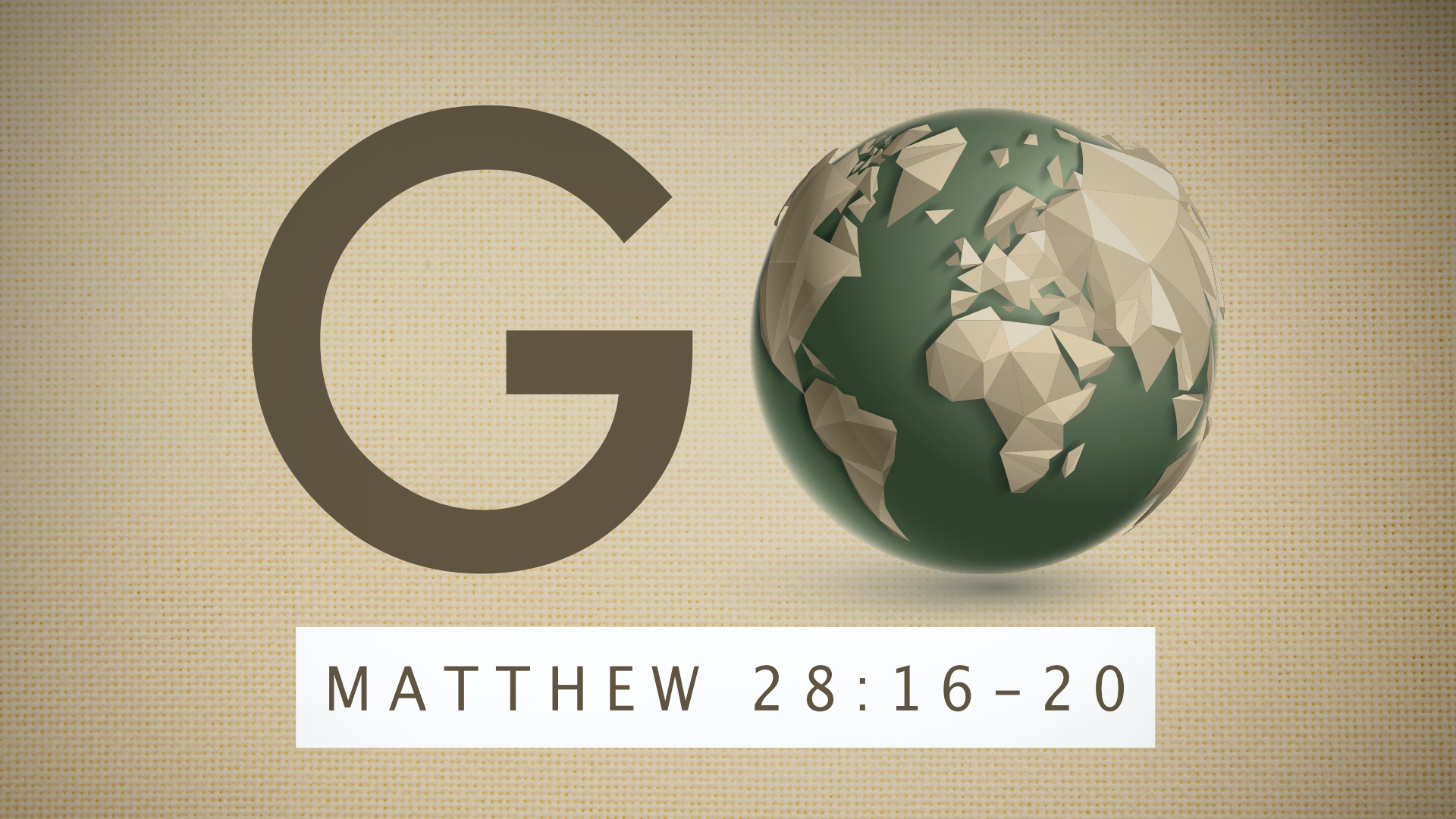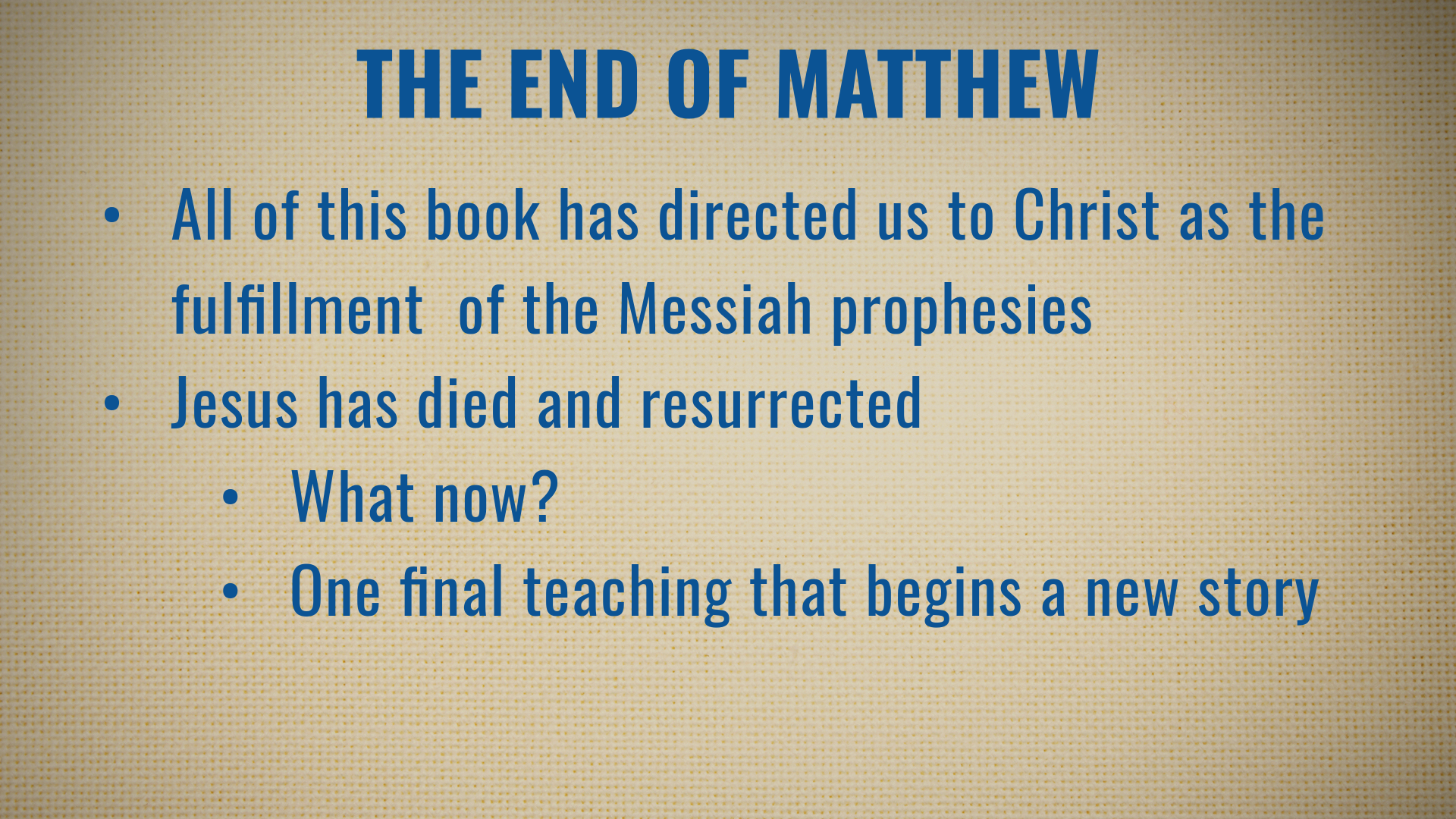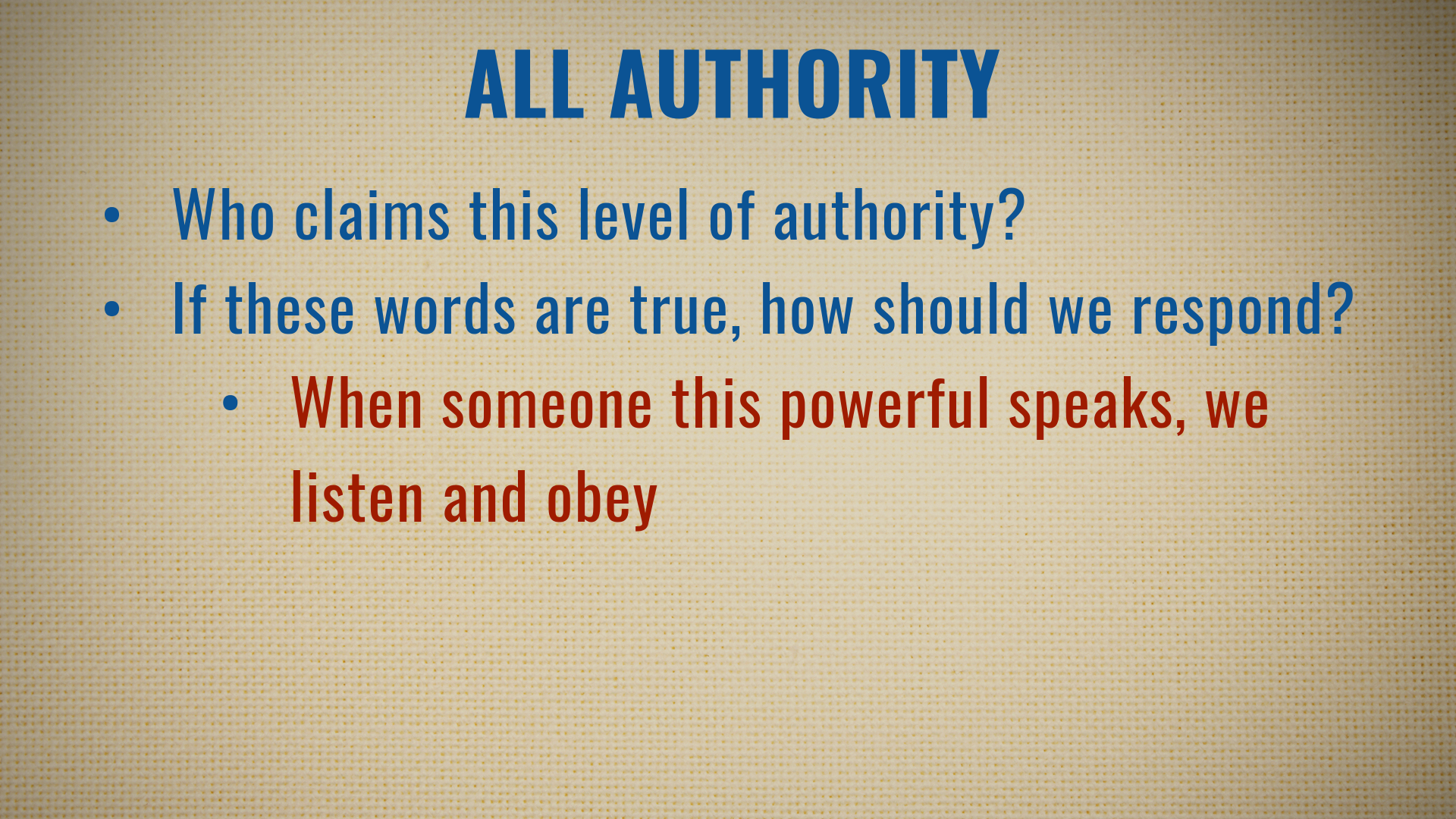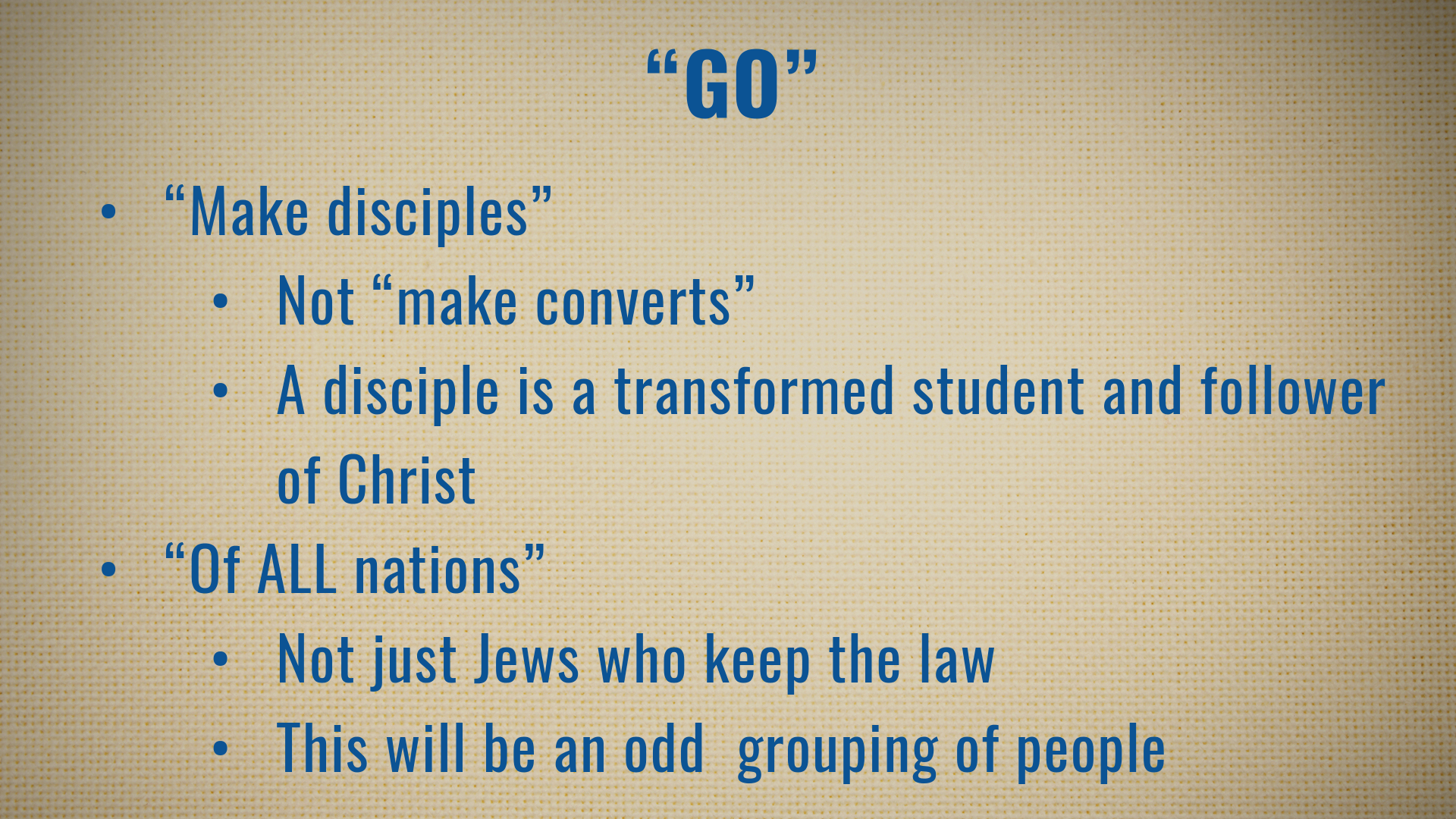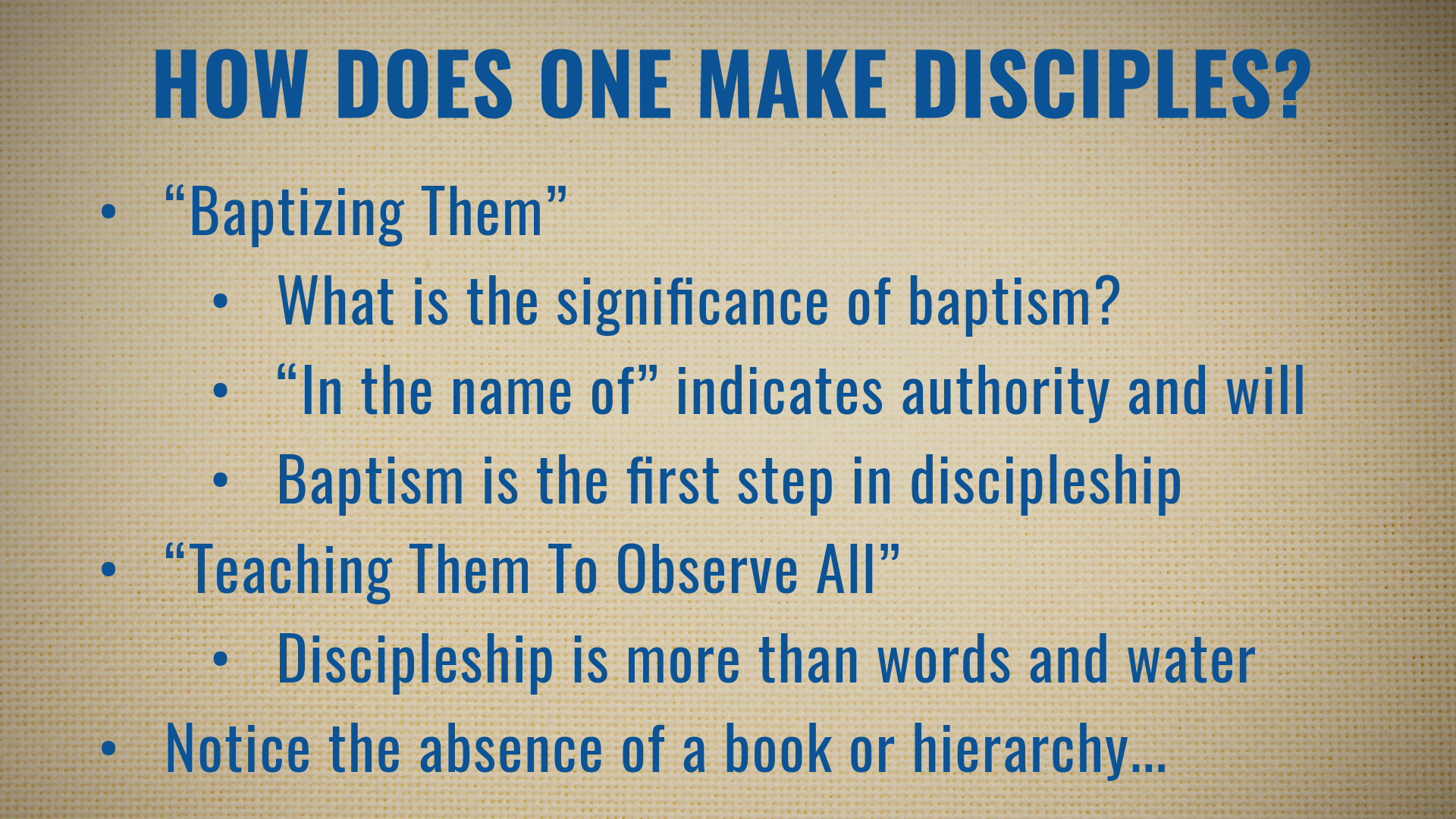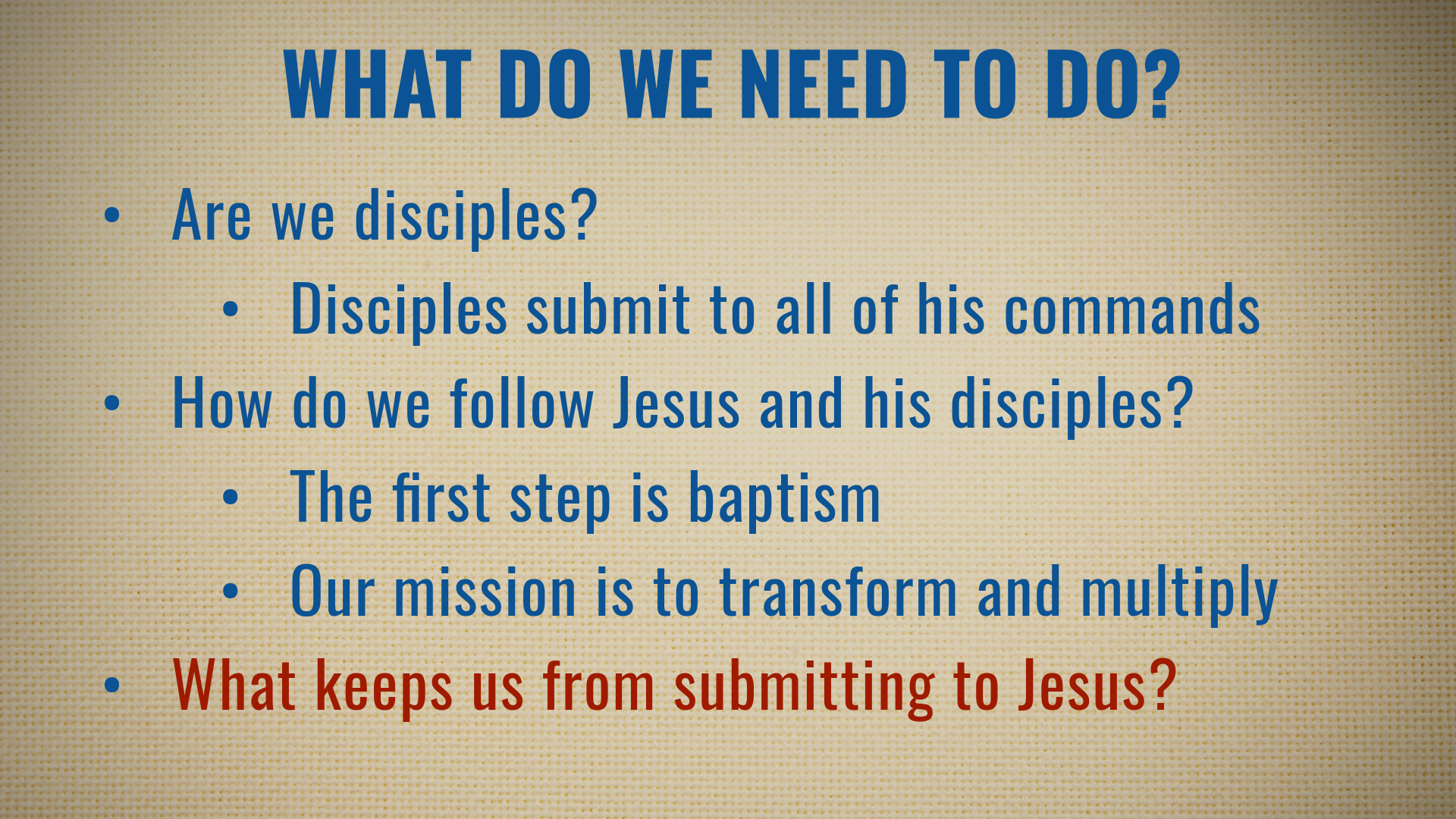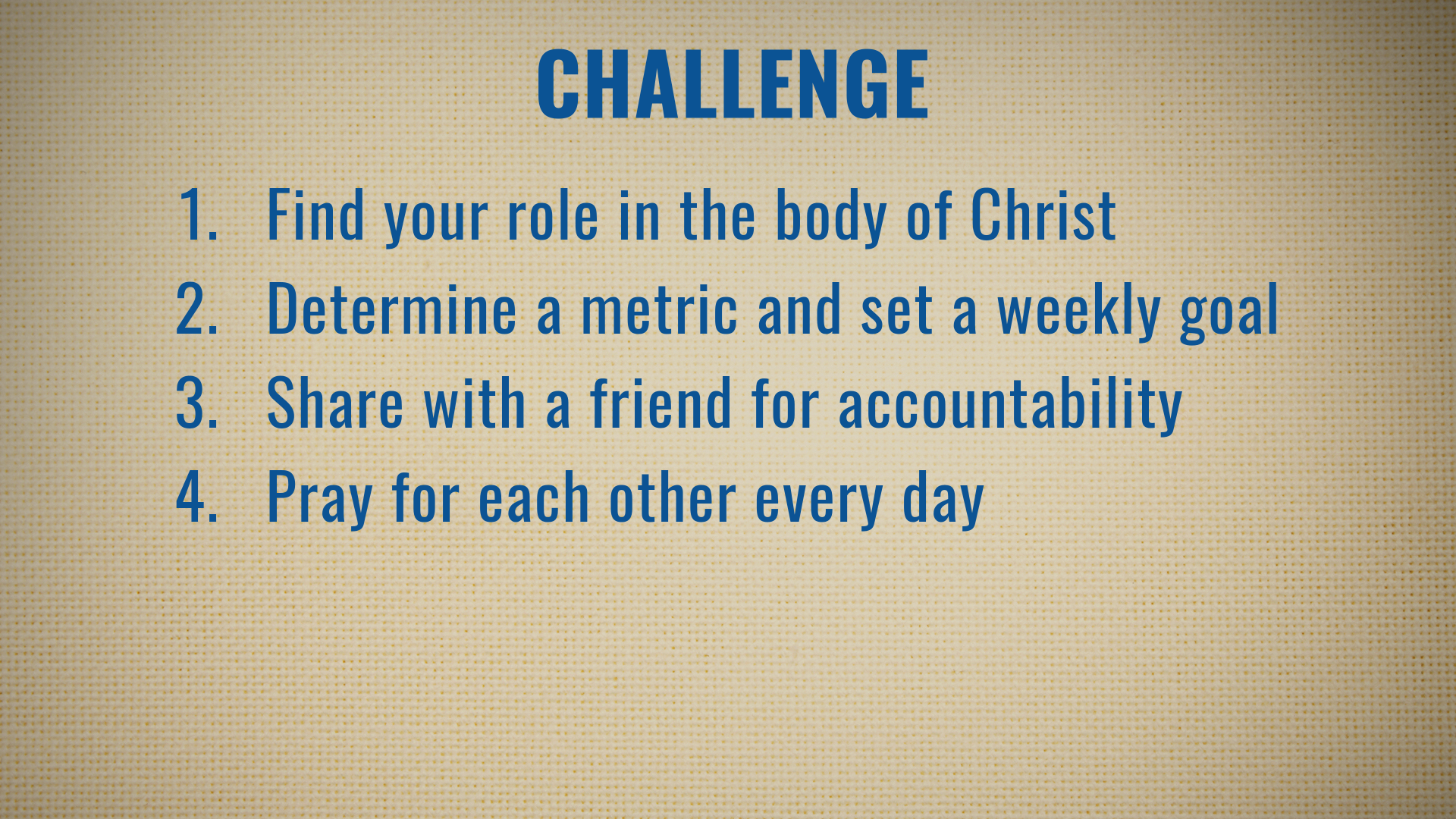Go (Matthew 28:16-20)
What is your vision for this church? What do you hope we would do, become, and look like? These are questions that I would love to know your answers to, but I wonder how your vision lines up with Jesus' vision.
Think for just a few moments about why we come here. There are a lot of places we could be. The church buildings around us offer more. They offer coffee and donuts. They focus on more than studying the Bible. They are organized like a business or a human institution. They have more people being paid for volunteering than the preacher. They don't expect 100% participation or for everyone to be equally devoted to their work in their role. What is so special about this place that you would stick with us for years and years?
The End of Matthew
Today we will look at the last five verses of Matthew's gospel. All of this book has pointed to Christ fulfilling the Old Testament. Now, he transitions to one final thought. This is the end, but also the beginning of something new. After Jesus was resurrected from the dead, he began to work through his disciples. This summary helps us understand their mission.
Matthew 28:16--20 (ESV) --- 16 Now the eleven disciples went to Galilee, to the mountain to which Jesus had directed them. 17 And when they saw him they worshiped him, but some doubted. 18 And Jesus came and said to them, “All authority in heaven and on earth has been given to me. 19 Go therefore and make disciples of all nations, baptizing them in the name of the Father and of the Son and of the Holy Spirit, 20 teaching them to observe all that I have commanded you. And behold, I am with you always, to the end of the age.”
This is a text you have probably heard before if you have been going to church for very long. It tells us that the disciples went to Galilee and learned what they were supposed to do. So what? Every word of Jesus in this section is pure gold.
"All Authority"
The first words I want us to focus on is verse 18. Consider who has ever been able to honestly say these words, "All authority in heaven and on earth has been given to me." If we heard someone say that, we would think that they are crazy. But Jesus worked miracles and demonstrated power over disease, sin, and even nature before dying and resurrecting. This isn't a crazy person. So we can believe that these words are valid.
Now, if these words are valid, what should that mean to us? Shouldn't it mean that everything else Jesus spoke in this text is essential? When the one who has all authority and power reveals his desire, we listen carefully. We want to be on their good side and do what they say. This is not just all authority on earth. It extends into heaven. Jesus has all of the mighty angels at his disposal to minister to us as he sees fit. Jesus also has the authority to decide what will happen after this life is over for us. We better listen.
"Go Make Disciples of All Nations"
The next words I want us to look at are in verse 19. He says, "Go make disciples of all nations." Notice that he doesn't say, "Go convert all nations." Our goal is not to convert people so that they say, "I believe in Jesus, and I want to give him my life." Our goal is to make them disciples. A disciple is a student or follower. He is speaking to his disciples and telling them to make more disciples. Make more people just like you. They need to follow me as you have followed me. They need to be trained by me as you have been. They need to make more disciples like you are doing. This is going to lead to multiplication and transformation.
Where are they supposed to go to make disciples? What is the extent of this mission? Notice that he opens it up to people beyond the Jews. He says to "make disciples of all nations." Their work sounds too big for them ever to get bored. It is a job that will never end. They are constantly supposed to learn how to make disciples of all nations.
That means that Christ's church will be an oddball group of people. We aren't all going to be alike. We have different backgrounds, cultural impressions, and opinions about how some things should be. But Jesus is where we all find our similarities.
"Baptizing Them"
In the rest of verse 19, he explains the first part of the disciple-making process. It's a part that is considered optional by most denominations today, but isn't that odd? How can we say that we are making disciples if we leave out the first part of the disciple-making process? Baptism isn't just an outward showing of inward faith. Baptism is the way we enter into the body of Christ (Gal 3:26-27; 1 Cor 12:13). Discipleship starts with being immersed in water. The Bible tells us that the Holy Spirit works in baptism to cleanse our conscience and renew our spirit by applying the blood of Christ to our hearts. Entering into baptism is not about joining a club but about becoming a member of the body of Christ. Our old way of life is supposed to end, and a new way of life will begin.
He says that this baptism needs to be done "In the name of the Father, and of the Son, and the Holy Spirit." Some people consider this a magical formula that has to be said for your baptism to be valid. But people who believe that are missing the point. It's not about what you say but your reason for being baptized. Is your baptism connected to the will of God, Jesus, and the Holy Spirit? Are you being baptized in accordance with their direction? Does your baptism revolve around the meaning they have given to baptism?
Consider how we use the phrase "in the name of." The most common situation where we hear "in the name of" is with police officers. They say, "Stop in the name of the law." That means that the police officer is commanding someone to do something based on the government's will. That person has probably broken the law instituted by the government, and they must stop and submit to the police officer, or they will be subject to force. The actions of the police officer are based on the will of the government, not his will. It's all about the meaning of the law that the government gave. Jesus told the disciples to baptize in the name of (according to the meaning and will of) the Father, Son, and Spirit.
"Teaching Them"
Verse 20 summarizes the process of disciple-making from baptism forward. Jesus tells his disciples to "Teach them to observe all that I have commanded you." Once someone has committed to follow Jesus, they need to be trained and equipped for that. It's not enough to say, "I will follow Jesus." There needs to be extensive training to take ownership of their role. These eleven men are going to be uniquely gifted with the Holy Spirit so that they can remember and understand everything that Jesus did, taught, and wants the church to do.
Notice that he is not instructing them to lead the new disciples or rule over them. Jesus' disciples are simply the conduit by which new disciples understand Jesus' teachings. Jesus doesn't tell them to rule over the church. The structure of what he says is very flat, with him as head of all and all disciples are serving the nations to make more disciples. There is no hierarchy being created.
That's It
There is no more information given about Jesus' mission for the disciples. This is just a summary of what Jesus told his disciples. We could go into other gospel accounts to get more, but this is sufficient for Matthew. He wants his Jewish readers to understand that the church of Christ is not a reproduction of Judaism. He's not setting up a new Sanhedrin council or making all the Jews priests over everyone else.
What Do We Need To Know?
So, in light of all of this, how should we react? Jesus gave his disciples a mission that is still going on today. The words of those disciples have been written down, and they are still training us to become disciples. Has Jesus become satisfied with the spread of the gospel? Have enough people been baptized and trained to observe all that Jesus commanded them? If that were the case, everyone would be disciples, and they would live as Christ commanded. There is still work for us all to do. The mission Jesus gives his disciples is our mission now. We are the hands and feet of Jesus on earth.
The question is will we let Jesus rule over our hearts and minds? Will we be faithful disciples of his? We need to understand his mission, own that mission as our mission, and work together toward fulfilling that mission.
What Do We Need To Do?
Now, let's get personal. Are you bringing the good news about Christ to the nations? If you are, some should be willing to listen and submit, not all but some. Where are they? This is our mission in life! Jesus has been given all authority and can let us in heaven or keep us out of heaven. He wants his good news to go out. Why wouldn't we do his will? Let me share some common excuses that I think we all make.
"Oh, I'm too busy. I have a lot going on and don't have time to work those spiritual conversations in." Really? Is someone holding a gun to your head and forcing you to do what they want every second of every day? Are you too busy?
"I don't know how to teach anyone. I'm not as well versed as a preacher might be. Who knows what they might say. I'm not ready to face that." It's funny how we can share all the information about our favorite sports team or our favorite hobby, but we can't share the good news of Jesus. We can argue with the best of them about politics, but we can't argue the case for Christ.
"To be honest, I just don't think about it. I've got so many other things on my mind." Have we bought into the narrative that all of the people around us are "good enough" to go to heaven? People around us are in danger of eternal judgment for their sins, and we call ourselves their friends. Do we not have any concern over their souls?
The root of the problem is not that we are too busy, ignorant, or distracted. It's that we don't care enough, and if we don't love people as Jesus has loved us, we aren't his disciples. That's what disciples do!
How?
So, the question we should be asking ourselves is, "How do we make disciples of the nations?" That's what our king wants. What role do we play? This is too big of a task for one person. But we can work together to accomplish much. Please pick an accountability partner or two accountability partners. Be sure that no disciple is left out. If you aren't a disciple, you are excused from this exercise. This person needs to be outside of your family, and it is their responsibility to hold you accountable for talking to one person every week this month about Jesus. This isn't too hard. Just talk to one person per week for four weeks. It will be a fun exercise.
Now, all you have to do is talk to someone new about your relationship with Jesus. Speak with grace, honesty, and boldness. You don't have to convert someone. Just talk to them about your love for God. You can tell them about this lesson or something you learned in your personal Bible study. You can bring up a verse that might help them with what they are going through. It's okay if this develops into a competition where you try to outdo one another. Schedule a weekly checkup to see how you are doing with your accountability partner.
If you are scared about this, Jesus' final words should be a huge source of comfort. Listen carefully to what he said. He said, "Behold, I am with you always." These words were intended to comfort and encourage the disciples to push on when things get hard. They had real dangers to look forward to. Our biggest threat is for people to say something about us that hurts our feelings. But if we speak with grace and love, that's probably not going to happen.
Invitation
If you are here and you realized throughout this sermon that you aren't following Christ as you should be, I want you to ask yourself, "Did I really get baptized into the body of Christ?" If the answer to that is no, that's the starting point. If the answer is yes, ask yourself, "What is my role in the body, and how can I start working to be a better disciple and make disciples today?" Being here four times a week is probably a good start. We don't come here to have fun, although we often do have fun. We come here to build one another up to fulfill our King's mission. We hold that up as the most critical work of Christ's church. That's why you want to be here.

